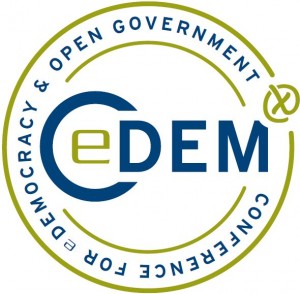 CeDEM11: The international “Conference on E-Democracy and Open Government 2011” takes place in Krems (Austria) on 5 and 6 May 2011. A substantial supporting programme has already been planned.
CeDEM11: The international “Conference on E-Democracy and Open Government 2011” takes place in Krems (Austria) on 5 and 6 May 2011. A substantial supporting programme has already been planned.
Follow these Links for further Information
]]>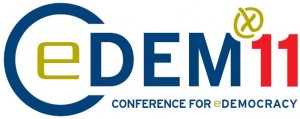
During the last 10 years, the world has focused on social media and the new forms of societal behaviour, including content generation, collaboration and sharing as well as network organisation. These behaviours and expectations, in particular transparency and access to data, new ways of interacting with government and democratic institutions will continue to develop, and profound changes in society are to be expected. Society has been confronted with Open Government, Open Data and Open Access. What have the experiences been so far? How do these impact society, democratic structures and organisations? What changes occur at citizen level? What are the implications for democracy, society, science and business?
The Conference for E-Democracy and Open Government - CeDEM11 – presents the following Tracks (Submission Deadline: 1 Dec. 2010):
E-Participation
- Julia Glidden (21C Consulting, UK)
- Jeremy Millard (Danish Technological Institute, DK)
- Norbert Kersting (Stellenbosch University, ZA)
Open Government
- Philipp Müller (University of Salzburg, Business School, AT)
- Axel Bruns (Queensland University of Technology, AUS)
E-Voting
- Melanie Volkamer (Technical University Darmstadt, GER)
- Thad Hall (University of Utah, USA)
Open Data and Open Access
- Andy Williamson (Hansard Society, UK)
Location: Danube University Krems, Austria
Date: 5-6 May 2011
Further Information at the Conference Website:
https://www.donau-uni.ac.at/cedem
DEADLINE for SUBMISSIONS: 1 December 2010
]]>10 NGOs representatives and activists from Armenia, Belgium, Hungary, Slovakia, Slovenia, Serbia, Poland and Romania attended the workshop.
Participants were introduced with E-participation / E-democracy concept, political documents of the Council of Europe relating to eDemocracy, current e-participation developments in Central and Eastern Europe and different e-participation tools as well as good practices. The second part of the workshop facilitated open discussion about opportunities for involving e-participation tools into current and future civil society projects in the region.
The workshop was lead by Mr. Csaba Madarász (e-democracy expert and consultant, Hungary) and Mr. Simon Delakorda, M.Sc. (Institute for Electronic Participation, Slovenia)
Citizens Participation University 2010 was organized by the Civil College Foundation and Central and Eastern European Citizens Network (CEE CN).
Csaba Madarász and Simon Delakorda
Workshop presentations:
1. eParticipation in the CEE: NGO’s perspective (pdf, 4,10 mb).

Citizens Participation University 2010 participants @ CEE CN

Simon Delakorda and Csaba Madarász @ CEE CN
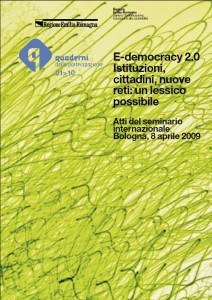 Il volume riporta integralmente i lavori del seminario internazionale tenutosi l’8 aprile 2009 a Bologna e organizzato dalla Regione Emilia-Romagna, in collaborazione con l’Università di Bergamo, l’associazione DEPP e il network europeo Pep-net.
Il volume riporta integralmente i lavori del seminario internazionale tenutosi l’8 aprile 2009 a Bologna e organizzato dalla Regione Emilia-Romagna, in collaborazione con l’Università di Bergamo, l’associazione DEPP e il network europeo Pep-net.
Nel corso del seminario, esperti italiani e internazionali, amministratori e practicioners, hanno tracciato un quadro delle esperienze di e-democracy realizzate in Italia e in Europa, evidenziandone limiti e potenzialità e individuando possibili prospettive di sviluppo. La strutturazione del seminario e il coinvolgimento di una pluralità di punti di vista e di competenze, ha consentito di affrontare, in una cornice integrata, le potenzialità democratiche del web 2.0, sia con riferimento alle esperienze di e-democracy istituzionale che alle forme di partecipazione online “dal basso”.
Le presentazioni dei relatori, Sabrina Franceschini, Anna Carola Freschi, Bryan Loader, Sandra Lotti, Wainer Lusoli, Rolf Lührs, Peter Mambrey, Mayo Fuster Morell, Luca Raffini, Laura Sartori, Chiara Sebastiani e il vivace dibattito che ha visto interagire i relatori con i numerosi partecipanti (oltre 160), hanno permesso di confrontare una pluralità di approcci teorici e pratiche. Loader in particolare ha sottolineato sia il carattere ambivalente dell’utilizzo delle nuove tecnologie come strumento di partecipazione e di ‘strong democracy’ oppure come semplice perfezionamento della democrazia neoliberista, sia la relazione fra utilizzo delle nuove tecnologie e processi di de-istitutionalizzazione.
Sebastiani ha evidenziato come le nuove tecnologie contribuiscono a trasformare la sfera pubblica e le pratiche democratiche, mentre Sartori si è soffermata sulla persistenza della questione del digital divide non solo in termini di accesso ma anche in termini di cultura digitale. Si è guardato all’esperienza statunitense, con particolare riferimento alla campagna elettorale di Barak Obama, per riflettere sulle opportunità di empowerment offerte dai nuovi strumenti del web 2.0 (Lusoli).
Sono state presentate e discusse criticamente esperienze di e-democracy istituzionale che possono rappresentare modelli di riferimento, come i progetti realizzati dalla Regione Emilia-Romagna (Franceschini), e si è riflettuto sui possibili strumenti e spazi di scambio di best practices, a partire dall’esperienza della rete pan-europea Pep-Net e dalla diversità degli approcci istituzionali collegati a differenti culture politiche (Lührs). Altri contributi hanno analizzato criticamente alcune esperienze di e-democracy “dal basso”, come le city wikis (Mambrey), i movimenti sui digital commons confrontando esperienze come Wikipedia e World Social Forum (Fuster Morrel) e i progetti realizzati dall’associazione DEPP –
Democrazia Elettronica e Partecipazione Pubblica come caso esemplare di tentativo di rovesciamento della logica verticale della ‘tecnopolitica’ (Raffini).
Infine, Anna Carola Freschi ha ripercorso le tappe che hanno segnato lo sviluppo dell’e-democracy in Italia, riprendendo gli stimoli del dibattito e le questioni irrisolte di una e-democracy che nonostante la varietà e la ricchezza delle esperienze, resta in larga parte “sognata”. Tra le criticità maggiori si sottolinea lo scollamento e la frequente tensione tra forme di (e) democracy istituzionale e processi di (e) participation “dal basso”. Forme di partecipazione individualizzate possano favorire dinamiche di atomizzazione e una frammentazione della partecipazione. La concettualizzazione proposta da Stefano Rodotà nei primi anni ’90 resta da questo punto di vista sempre illuminante nell’evidenziare un’irrisolta ambiguità tra uno scenario di partecipazione continua e uno scenario di tecnopolitica, tra un utilizzo delle nuove tecnologie come strumenti di partecipazione e il loro utilizzo come strumenti di controllo e di manipolazione. Come sottolinea Anna Carola Freschi, “costruire a tavolino la partecipazione, senza tenere conto della domanda di partecipazione che matura nelle città, nei territori, è del tutto vano rispetto all’obiettivo di migliorare la qualità delle nostre democrazie”.
Gli atti del seminario “E-democracy 2.0 – Istituzioni, cittadini, nuove reti: un lessico possibile” rappresentano un importante contributo al dibattito sull’e-democracy in Italia e in Europa, permettendo di fare il punto sullo stato dell’arte dell’e-democracy ai tempi del web 2.0 e di individuare le direzioni future della pratica e della ricerca.
Filo conduttore dei diversi contributi è il tentativo di decostruire le retoriche che accompagnano l’implementazione di processi istituzionali di e-democracy, di sviluppare un’analisi critica del rapporto tra utilizzo delle nuove tecnologie per la partecipazione e trasformazione delle forme e degli attori della politica, di analizzare in una prospettiva integrata le forme di e-democracy istituzionale e le esperienze autonome di partecipazione online, con particolare riferimento all’utilizzo dei social networks. Nei diversi contributi è emerso un generale consenso su un aspetto centrale: l’e-democracy non può essere pensata nei termini di processi isolati e autonomi, ma come una dimensione della partecipazione, interconnessa con le forme di partecipazione offline. È in questa ottica che molti contributi sottolineano il limite intrinseco di una concezione della partecipazione (non solo elettronica) come un distinto ambito di policy, piuttosto che come un orientamento trasversale da adottare nella progettazione e nell’implementazione delle policies.
Il panorama complessivo che emerge è quindi difficilmente semplificabile in slogan stereotipati, e può essere compreso solo a partire da un’analisi critica dei rapporti tra mutamento culturale, mutamento politico e mutamento tecnologico, superando il determinismo tecnologico che ha spesso caratterizzato gli studi sull’e-democracy. Una migliore comprensione delle implicazioni dell’uso dei nuovi media per la democrazia non può che dipendere da una collocazione di questo fenomeno nel contesto più ampio di una riflessione critica sulle trasformazioni che investono la democrazia nella società contemporanea.
Luca Raffini (Università di Bergamo)
]]>The article is providing a short description of the most visible of recent e-participation initiatives implemented by the non-governmental organizations in Slovenia including:
1. Citizen’s forum European Debates (https://www.evropske-razprave.si/)
2. NGO’s e-Participation portal during the Slovenian EU Council Presidency (https://www.predsedovanje.si/)
3. Open-source NGO’s e-Participation platform for on-line civil dialogue (https://www.sodeluj.net/)
4. Slovenian Civil Society e-Participation web service (https://www.e-participacija.si/)
Simon Delakorda, M.Sc.
Institute for Electronic Participation
Web: https://www.inepa.eu
According to the latest UN E-Participation Index measurement, the majority of South East Europe countries (Albania, Croatia, FYR Macedonia, Moldova, Montenegro and Romania), improved their global standing regarding the quality and usefulness of information and services for the purpose of engaging its citizens in public policy making through the use of e-government programs. Nevertheless, e-participation in SEE region is still falling behind their e-government developments. An overview of current e-participation situation in SEE within government domain is presented, highlighting key elements needed for strengthening e-democracy in the region. One of them is focusing on non-governmental organizations and civil society e-participation experience (e.g. on-line Citizen’s forum) needed for shaping inclusive and citizens oriented e-government policy.
Presentation slides are available at the Institute for Electronic Participation web site https://www.inepa.si/images/stories/mapping_edemocracy_see_region_delakorda.pdf (pdf, 1.49 mb).
As has become customary over the years the conference concluded with a draft declaration, which had been adopted by the participants of the conference. The process of formulating the declaration is based upon the main issues presented by the lecturers and highlighted by the participants in the discussions which followed.
To achieve even wider participation in the formulation of the Final Declaration of the 11th Bled Forum on Europe, your are kindly invited to provide comments, inputs, questions, add issues important to the development of information society not only in South East Europe, but around the world.
Please send your comments or your video responses to info.cegd@cegd.eu until the 12th of April 2010 and make sure your voice is heard and your opinion is included in the final declaration. You can publish your comments directly to European Debates on-line forum facilitated by the Institute for Electronic Participation (INePA) by fulfilling discussion form (Please enter your Username – Uporabniško ime, message Confirmation code – Potrditvena koda and submit your comment – Pošlji. No prior forum registration is required. Forum is also available in English language). The forum is providing a deliberation space for facilitated public debates and consultations on relevant European issues.
Web links to relevant sites:
Draft declaration of the 11th Bled Forum (pdf, 71 kb)
European Debates on-line forum
Simon Delakorda, M.Sc.
Institute for Electronic Participation
It is widly known, that these kind of events although trying to push together some stakeholders of the fields around the “Digital Public Works”, but the success is mainly based on the organizers creativity.
One interesting thing beside the real reason, why I am typing this article, is a programme from the Hungarian Telecottage Association – called the Digital Solidarity Catalogue.
It is in an old fashioned e-book format from Flipviewer – for me I see no reason, why not to use the internet for these kind of publishing acts – which is a collection of IT programs from different areas with a social focus. It is a nice collection with strong focus on Hungary.
During the last year, it has become obvious for most of us, that the culture of e-democracy is widely embedded in different political cultures of each country – and Hungary is in the disadvantaged group right know.
A strong representation for this, is in a slide – and a speech – which has been held by dr. Akos Balint, the programme leader of the Hungarian National Development Agenency’s (responsible for the EU-money programs) Public Service Reform Directional Program.
As can be seen on this slide – the EKOP programme for public service reform has 5 levels. It has been said, that this is align with the EU (?) structure of CLBPS (Common list of basic public services).
No doubt for us, that E-democracy is not part of the CLBPS, although, it has some relation to all levels. We should have the question in our mind – what is the reason for putting the power and trust that e-democracy can offer to societies to such a place, that will not have and support?
In my understanding, one solution, that mr.Bálint do not really know, what is e-democracy.
The other one is there is no real reason in the mind of the decision makers, to support e-democracy in Hungary from these programmes… I do not really want to choose.
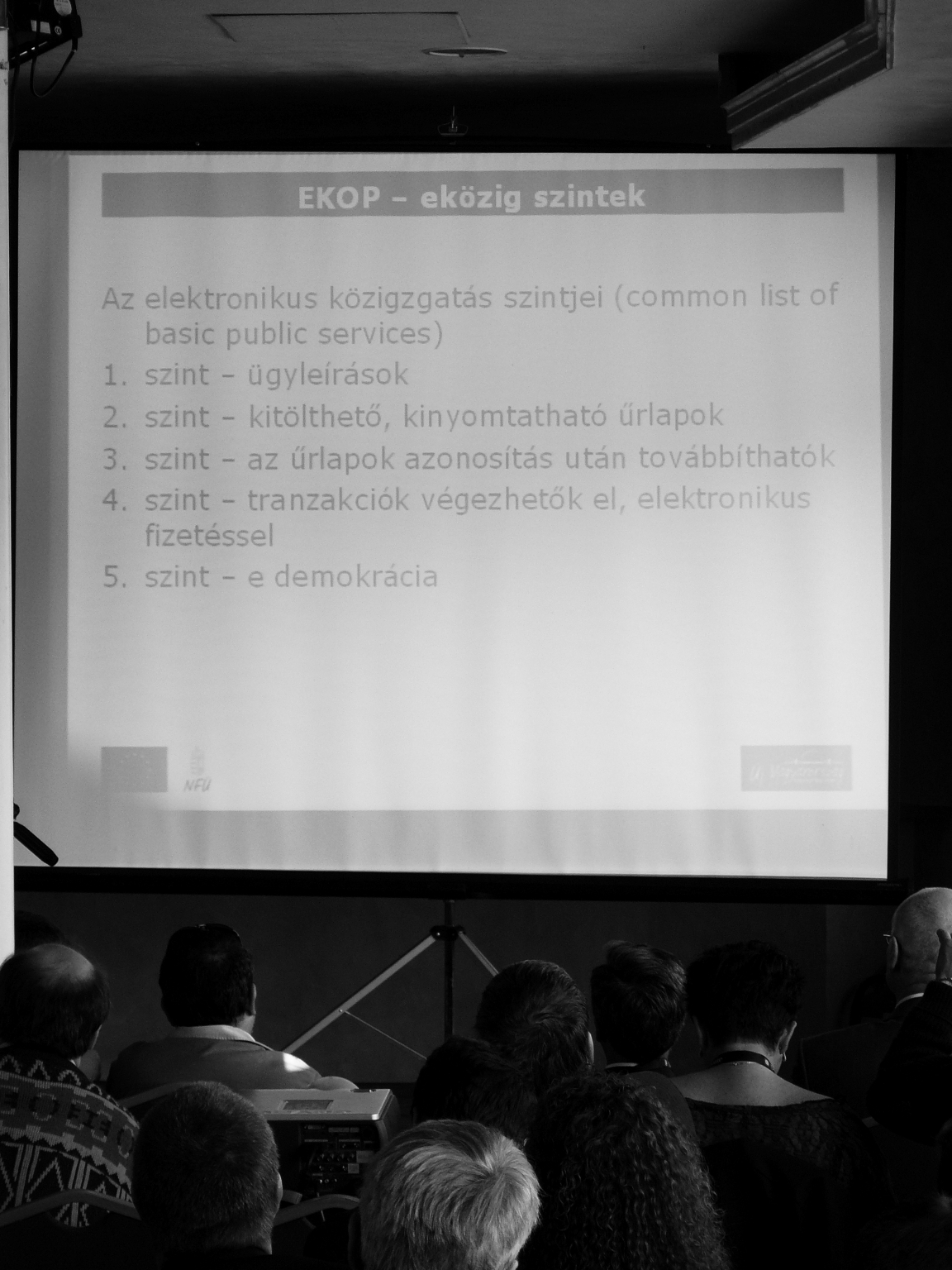
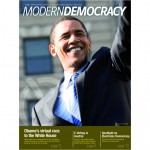 interest magazine “Modern Democracy” by E-Voting.CC.
interest magazine “Modern Democracy” by E-Voting.CC.As I have announced in an earlier entry we issued the first edition of our magazine dealing with selected topics in the field of E-Democracy and it’s newest developments. The magazine is distributed all around the world.
Before I give you a quick overview of the contents, I want to thank all of you who have mailed us the registration coupons. The responses were overwhelmingly positive and gave us the affirmation that such a magazine is needed and wanted. Thank you for all the positive feedback!
The first article deals with the upcoming student union elections in Austria. This event will mark the entry of Austria into the list of countries with legally binding electronic elections. Students will be able to cast their vote via Internet from May 18th until May 22nd – one week before the paper election. The results will be counted after the last polling stations are closed.
The intention behind this project is to give every student an easy and uncomplicated way of participating in these biannual elections and to innovate the Austrian voting procedures.
The magazine also features an article dealing with a deeper insight into the results of the CAHDE working group of the Council of Europe. A roadmap shows the different stages of E-Democratic tools how they relate to each other.
My main contribution to the magazine was an email-interview with Matthew McGregor. He works for Blue State Digital, a full service agency that offers integrated campaign design. By the way: I met Matthew on Dan Jellinek’s great e-Democracy08 conference in London, in November 2008.
In the interview we ponder about what new forms of online campaigning can do for democracy or about which lessons European politicians can learn from Obama’s unprecedented Internet presence.
Other topics are conference reviews of 2008’s most important E-Democracy events and a schedule for 2009, a book review and a market survey of companies who are specialized in E-Voting technology.
If you are interested in obtaining our magazine, which will be issued twice a year, just send us an email with you name & address to: modern-democracy@e-voting.cc
You can also download the latest issue from our website.
We’d be glad to send you your copy for free and without any obligations!
Daniel Botz, E-Voting.CC
]]>It shall clarify the critiques on the CAHDE working-group, posted here earlier, which – in our opinion – missed out some details about the project.
The Council of Europe (CoE) established in 2002 the Ad-Hoc Committee on Electronic Democracy (CAHDE) aiming at creating a legal document suggesting standards of E-Democracy, formulating principles for introduction and providing generic definitions and analyses of tools and policies to facilitate the introduction of E-Democracy. The goals were challenging and manifold: they span from the general reaffirmation of essentials of democracy and the extension of democracy by using ICTs to facilitate information and deliberation of political issues and until the increase of transparency and accountability of democratic institutions and processes. The Committee of Ministers adopted the recommendation on February 18th, 2009.
A critical discussion of results and outcomes is important and necessary. Especially if we are aiming at giving advice on upcoming developments and technologies, that are not mainstream in the near future. Let us clarify some important points in advance and sketch the framework for discussion.
E-Democracy itself is at first the implementation of political processes with the support of ICTs. This electronic extension of democracy is changing the opportunities to participate and deliberate in the public discourse. Democracy is becoming more direct and E-Democracy could lead to a more participative democratic culture. Besides this very positive possible long-term goal E-Democracy is faced with high demands and expectations of saving the whole democratic culture. This healing power does not automatically exist, but using the Internet increases the opportunities for communication and political participation. The Internet is not an apolitical sphere, but we are still at the beginning of exploring the various opportunities that lay ahead of us. Nevertheless the current imaginable tools, practices and policies within the framework of E-Democracy are subject to a complex, demanding and sometimes time consuming development and implementation process. Time is probably the most important resource on the road to an inclusive and integrated electronic democracy.
One key component of the CAHDE work was research of already established tools and policies of E-Democracy and the deduction of generic tools and policies for top-level recommendations on how and when to implement specific tools or policies. E-Voting.CC, the Competence Center for Electronic Voting and Participation carried out this research on tools and policies on behalf of CAHDE. This overview of 33 tools and policies is presenting a comprehensible and quick overview of possible ways and methods of introducing electronic democracy. The aim is to provide a guide for the implementation of a fully supported E-Democracy on all different levels – from public authorities to NGOs and even single citizens. The generic tools and policies are drawn from a research on more than 100 international examples of using electronic means with regards to electronic democracy.
The level of abstraction is significantly high when deducting general guidelines and conclusions. Single citizens can use the recommendation and the overview of generic tools and policies equally to governments, public authorities and NGOs to get an overview of possible tools and policies, which are available on different levels.
The tools and policies are not meant to be a concrete set of instructions in the sense of how to do e-democracy like an instruction how to setup a wardrobe after buying it in the furniture store. The recommendation, the work of CAHDE and especially the research and analysis of generic tools and policies leads to conclusions on the future development of E-Democracy and shed light on a very important development of democracy.
Nevertheless a set of practical recommendations for its introduction is part of the recommendation and available to everyone outside the Council of Europe through the Internet, which allows access for every interested stakeholder of the society and enables them to make use of the provided knowledge and information.
The CAHDE project was a valuable step in the right direction: Towards better understanding of e-democracy and its tools and also towards easier implementation of e-democracy initiatives through the framework provided by the recommendations.
by E-Voting.CC
]]>We will also include short news, detailed news, project news, recent developments and articles. We would be glad to get your input regarding projects and recent developments in the field.
Should you be interested in enrolling in our subscription list or should you want to contribute to our magazine, please send us an email (office@e-voting.cc) with your postal data, name and your email address.
We wish you a happy new year and we’ll inform you as soon as the magazine is available.
Daniel Botz, E-Voting.CC